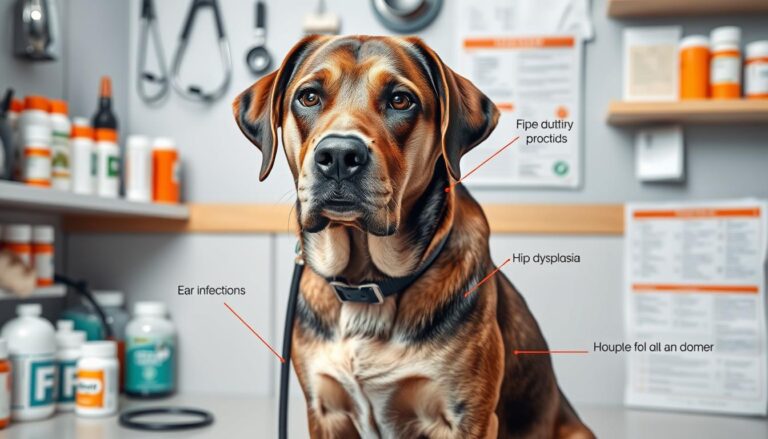Dog Heartworm Test: What Pet Parents Need to Know
Dog Heartworm Test: As a pet parent, keeping your dog healthy is key. Regular heartworm tests are a big part of that. Heartworms are harmful worms that can seriously affect your dog’s health. Testing early is crucial for treatment and care.
This article will teach you about the importance of heartworm tests for dogs. You’ll learn about different testing methods, when to get your dog tested, and how to prevent and manage heartworms. Knowing about these tests helps you protect your dog’s health.
Table of Contents
Key Takeaways
- Heartworms can pose a serious threat to your dog’s health and must be detected early through regular testing.
- Various testing methods, including antigen tests and microfilariae detection, are available to accurately diagnose heartworm infection.
- Scheduling your pet’s heartworm test at the appropriate time is crucial to ensure timely detection and intervention.
- Understanding test results and available treatment options can help you make informed decisions about your dog’s care.
- Combining regular testing with prevention strategies is essential for maintaining your dog’s long-term health and wellbeing.
Understanding Heartworm Disease in Dogs
Heartworm disease is a serious condition that can be deadly for dogs. It’s caused by a worm called Dirofilaria immitis. This worm lives in a dog’s heart and blood vessels, harming their health.
How Heartworms Affect Your Dog’s Health
As heartworms grow, they can block blood flow and damage organs. They can also harm your dog’s lungs. If not treated, heartworms can cause heart failure, lung disease, and even death.
The Lifecycle of Heartworms
- Mosquitoes spread the infective larvae to dogs during a blood meal.
- The larvae grow into adult worms, living up to 7 years in the dog’s body.
- Adult female worms release microfilariae into the dog’s blood, starting the cycle again.
Risk Factors for Heartworm Infection
Some factors make dogs more likely to get heartworm disease. These include:
- Geographic location: Warmer climates with lots of mosquitoes are riskier.
- Outdoor activity: Dogs that spend more time outside are more exposed.
- Lack of prevention: Not using pet wellness meds can leave dogs unprotected.
Knowing about heartworm disease is key to keeping your dog healthy and safe.
Why Regular Dog Heartworm Test Is Essential
Keeping your dog healthy is a big deal, and regular heartworm prevention tests are key. Heartworm disease is very serious and can be deadly if not caught early. Testing your dog regularly is the best way to keep them safe.
Testing for heartworms helps find the disease early, before it hurts your dog’s organs. Finding it early means your dog can get better faster and avoid serious problems later.
- Regular testing means your dog gets the help they need quickly, leading to better health.
- Early detection means treatments are easier and cheaper, saving your dog and your money.
- Testing as part of your dog’s health plan keeps them feeling their best.
“Consistent, proactive heartworm testing is the best way to safeguard your dog’s health and ensure they live a long, happy life.”
By making regular pet health screening a priority, you’re doing a lot to protect your dog. Heartworm prevention is vital, and veterinary diagnostics help keep your dog happy and healthy for years.
Types of Heartworm Testing Methods
Diagnosing heartworm disease in dogs is key to their health. Veterinarians use several tests to find these worms. Knowing about these tests helps pet owners care for their dogs better.
Antigen Testing Process
The antigen test is a common method. It looks for heartworm proteins in a dog’s blood. This test is quick, easy, and non-invasive, making it great for regular check-ups.
Microfilariae Detection
Microfilariae detection is another method. It looks for immature heartworms in the blood. This test uses a microscope to find these tiny worms. However, it’s not as good as antigen testing for early infections.
Combination Testing Approaches
Many vets use both antigen and microfilariae tests together. This combo gives a clearer picture of a dog’s health. It helps catch infections early and ensures the right treatment is given.
Regular check-ups and prevention are vital for your dog’s health. They help avoid the serious problems caused by heartworm disease.
When to Schedule Your Pet’s Heartworm Test
Keeping your dog healthy is key, and regular dog heartworm tests are a big part of that. How often you need to test depends on your dog’s age, lifestyle, and where you live.
Puppies and young dogs should get their first heartworm prevention test around 7-8 months old. They are more likely to get infected. Adult dogs need a test every year to keep them safe from heartworms.
If you live in a place where heartworm is common, your vet might want to test your dog more often. Even if your dog is on preventive medicine, no method is 100% safe. Regular tests can catch problems early.
No matter your dog’s age or where you live, listen to your vet about when to test for dog heartworm tests. Being proactive about your pet’s health keeps them happy, healthy, and heartworm-free.
| Age | Heartworm Test Frequency |
|---|---|
| Puppies (7-8 months) | First test |
| Adult Dogs | Annual test |
| High-Risk Areas | More frequent testing |
“Regular dog heartworm tests are the best way to ensure your furry friend’s continued pet wellness and protection against this devastating disease.”
Signs Your Dog May Need Immediate Testing
It’s important to watch your dog’s health closely. Knowing when to test for heartworms is key. This can help catch problems early and keep your pet healthy for a long time.
Early Warning Symptoms
Look for small changes in your dog’s behavior or health. These could mean they have heartworms. Watch for:
- Persistent cough
- Decreased appetite or weight loss
- Fatigue or lethargy
- Reduced exercise tolerance
If you see these signs, get your dog to the vet fast.
Advanced Disease Indicators
As heartworms get worse, symptoms get more serious. These signs need quick action and testing:
- Difficulty breathing or labored respiration
- Swollen abdomen or legs
- Pale or discolored gums
- Fainting or collapse
If your dog shows these signs, get help right away.
Emergency Warning Signs
In serious cases, heartworms can be very dangerous. Look out for these urgent signs:
- Sudden collapse or seizures
- Severe, persistent coughing or vomiting
- Rapid, irregular heartbeat
- Difficulty breathing or gasping for air
If your dog has any of these signs, call the vet or go to an emergency clinic.
The Cost of Heartworm Testing and Prevention
Keeping your dog healthy is very important. Understanding the costs of heartworm prevention helps protect your pet. Let’s look at the costs of heartworm testing and prevention.
Heartworm testing is key for your dog’s health. A basic test costs between $15 and $50. This is much less than treating heartworms, which can cost over $1,000.
Monthly heartworm medication costs $6 to $15. This means spending $72 to $180 a year. This is a small price to pay for avoiding serious heartworm disease.
| Heartworm Test Cost | Preventive Medication Cost |
|---|---|
| $15 – $50 | $72 – $180 per year |
Regular heartworm testing and prevention save money and stress. It keeps your dog healthy and avoids big vet bills. This proactive care is worth it for your pet’s long-term health.
Understanding Test Results and Next Steps
Understanding your dog’s heartworm test results is key to their health. Whether it’s positive or negative, knowing what it means is crucial. Your vet will guide you on what to do next.
Positive Test Results Protocol
If your dog tests positive, they have heartworms. This calls for quick action and more tests. Your vet will do bloodwork and X-rays to see how bad it is. They’ll then create a treatment plan just for your dog.
Treatment Options Available
- Adulticide therapy: This involves a series of injections to kill adult heartworms. Your vet will watch your dog closely during this time.
- Macrocyclic lactone therapy: Your vet might give your dog a special heartworm medication. It kills the young heartworms and helps protect your dog’s health.
- Surgical extraction: Sometimes, removing the heartworms surgically is needed. This is usually for severe cases or high-risk dogs.
It’s vital to follow your vet’s treatment plan carefully. Skipping or delaying treatment can harm your pet badly.
A positive dog heartworm test isn’t the end. With the right treatment, your dog can get better and live a happy life. Talk to your vet to find the best treatment for your dog.
Preventing False Test Results
Getting accurate heartworm tests is vital for your dog’s health. False positives or negatives can happen, leading to wrong treatments or delayed diagnoses. It’s important to know what can affect test results to ensure your dog gets the right care.
False positives can happen if microfilariae, the early form of heartworms, are present. These tiny worms can show up on some tests, even if your dog isn’t infected. Your vet might do extra microfilariae detection tests to confirm.
False negatives can occur if the test is done too early. Heartworm antigen tests look for adult worms, missing early infections. Your vet might suggest doing both antigen and antibody tests for a clearer picture.
How the sample is collected and handled is also key. Bad handling can lead to wrong results. Make sure your dog’s heartworm test is done right, following veterinary diagnostics best practices.
If you’re worried about your dog’s heartworm test results, talk to your vet. They can guide you on what to do next and ensure your pet gets the best care.
Combining Testing with Prevention Strategies
Keeping your dog healthy is very important. Protecting them from heartworm disease requires a full plan. Regular heartworm testing and preventive care are key to keeping your dog happy and healthy.
Year-round Prevention Methods
Protecting your dog from heartworms is a year-round job. Your vet will give you heartworm medication to use all year. Even when it’s cold, mosquitoes can still be around, so keep up with the treatment.
Medication Options and Schedule
There are many heartworm medication choices, like chewables, topical treatments, and shots. Your vet will help pick the best pet wellness plan for your dog. It’s important to stick to the schedule to keep your dog safe.
Regular heartworm tests and prevention are crucial for your dog’s health. Being proactive and working with your vet will help keep your dog safe from heartworms.
Regional Considerations for Heartworm Testing
Heartworms pose different risks in different places. Knowing the heartworm risk in your area is key for keeping your pet safe. This knowledge helps in setting up the right pet health screening and prevention plans.
In the U.S., heartworm disease varies by region. Warm, humid areas have more heartworm cases in dogs. If you live in these areas, it’s vital to test your dog regularly for heartworms.
| Region | Heartworm Prevalence | Testing Recommendation |
|---|---|---|
| Southeastern U.S. | Very High | Annual Screening |
| Gulf Coast States | High | Annual Screening |
| Northeastern U.S. | Moderate | Biennial Screening |
| Western U.S. | Low | Biennial Screening |
Knowing about canine parasites in your area helps you make better health choices for your pet. It ensures they get the right mosquito-borne illness tests and prevention.
“Heartworm disease is a serious and potentially fatal condition that can affect dogs in all 50 states. Regular testing and prevention is crucial for protecting your pet’s health.”
- Understand the heartworm risk level in your region
- Schedule annual or biennial heartworm testing for your dog
- Discuss prevention strategies with your veterinarian
The Role of Mosquitoes in Heartworm Transmission
Mosquitoes are key in spreading heartworm, a serious canine parasite. They help the larvae grow and move from one host to another.
The mosquito-borne illness starts when a mosquito bites an infected animal. It then eats the tiny larvae, called microfilariae. Inside the mosquito, these larvae grow into a form that can infect another animal.
When mosquito numbers go up, so does the risk of heartworm prevention. Mosquitoes are most active in warmer months, especially in summer and early fall. This means dogs are more likely to get heartworm disease during these times.
- Mosquitoes play a vital role in the transmission of heartworm, a serious and potentially fatal canine parasite.
- The heartworm lifecycle begins when a mosquito bites an infected animal and ingests the immature heartworm larvae.
- Seasonal fluctuations in mosquito activity can significantly impact the risk of heartworm infection in dogs.
To keep dogs safe from heartworm prevention, owners must work with their vets. They should use prevention meds all year, test regularly, and control mosquitoes in their area.
“Mosquitoes are the sole route of transmission for heartworm, making their control a crucial component of any heartworm prevention program.”
Knowing how important mosquitoes are in spreading canine parasite helps owners protect their pets. They can take steps to keep their dogs healthy and safe.
Conclusion
Regular dog heartworm test and heartworm prevention are key for your pet’s wellness. Knowing the risks and how to test helps protect your dog from heartworm disease. Working with your vet is crucial.
Early detection and prevention are vital. Keep up with tests and use preventive meds. This way, you can protect your dog. Stay alert and talk to your vet about the best prevention for your area and dog.
Make heartworm testing and prevention a big part of caring for your dog. With your vet’s help, your dog can stay healthy and happy. This keeps them safe from heartworm disease.
FAQ
What is a heartworm test for dogs?
A heartworm test for dogs checks for heartworm infection. Heartworms are parasitic worms that live in a dog’s heart. They can cause serious health problems if not treated.
How often should my dog be tested for heartworms?
Dogs should be tested for heartworms at least once a year. Even if they’re on heartworm prevention, it’s still important. Your vet will tell you how often based on your dog’s age, lifestyle, and where you live.
What are the different types of heartworm tests for dogs?
The main heartworm tests for dogs are the antigen test and the microfilariae test. The antigen test finds heartworm proteins. The microfilariae test looks for the early stages of heartworms. Some vets use both tests for a more accurate diagnosis.
How much does a heartworm test cost for a dog?
The cost of a heartworm test for dogs varies. It depends on where you are, the vet clinic, and the test type. A basic antigen test costs between to . More detailed tests can cost to 0 or more.
What are the signs that my dog may need an immediate heartworm test?
Signs your dog might need a heartworm test include lethargy and coughing. They might also have trouble breathing or losing weight. These symptoms mean your dog might have advanced heartworm disease and needs vet care fast.
How can I prevent my dog from getting heartworms?
To prevent heartworms, keep your dog on heartworm prevention medication all year. Your vet will prescribe it. Regular testing is also key to make sure the medication works.
What happens if my dog tests positive for heartworms?
If your dog tests positive for heartworms, your vet will do more tests. They’ll check how bad the infection is. Treatment is available but can be expensive and risky. Your vet will help find the best treatment for your dog.







